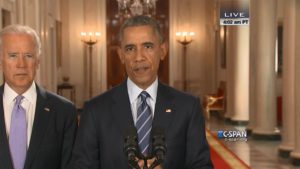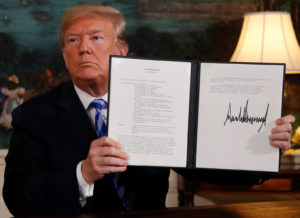Look at the U.S.-Iran Relationship—It Was Mostly Fixed, Trump Blew It Up And Now Both Sides Threaten Each Other
PARIS—An old friend in Monaco, a retired European military historian, sneered at me when I asked about the escalating crisis in the Persian Gulf between the U.S. and Iran—the one that’s pulling in the U.K. and the international community, the one TV analysts say could result in a “ferocious” response from Iran if the U.S. ever attacks.
“Does anyone in your country even know where Iran is on the map?” he asked. “Or do they get it mixed up with Iraq? I bet they have no idea they’re dealing with a country with 7,000 years of incredible political and cultural history that looks at the United States, and especially Donald Trump, as if you’re all a bunch of monkeys.”
Whether it’s a landmark affordable healthcare act or a hard-won nuclear agreement, if Obama was in large part responsible, it must go.
Harsh, but does the average American citizen know that Iran was once a major world empire that stretched from the Indus River in India to present-day to Morocco and was the cradle of science, technology, mathematics, philosophy and astronomy?
It’s just as doubtful that anyone on the street in America could cogently explain why Washington might be on the brink of war with Tehran. After all, this is an issue which query gives even certified experts pause.
It doesn’t help that our so-called “forever wars,” ongoing since 9-11 and mainly involving the Middle East, have normalized the idea of America invading, attacking or lending a toxic helping hand in distant conflicts especially when the reasons given to do so are often based on lies (like Iraq) or without any logic (like Libya.)
You can read about Trump’s crippling economic sanctions against Iran, his aborted strike against Iran after an American drone was allegedly downed, oil tankers being seized on both sides, ballistic missiles being test-fired, the Islamic Revolutionary Guard Corps swarming ships in the Hormuz Strait in their British-made Boghammar boats.
But what’s really going on behind the confusing theatrics of the past two months?
No Good Reason for Conflict
“That’s a good question,” said Ali Vaez, the Iran specialist at the Crisis Group, headquartered in both Washington and Brussels. “And the answer is… there is no good reason for what’s happening. The main concern is supposedly Iran’s ability to develop nuclear weapons. But when Trump came into office he was the first president to not have to worry about that.”

Why didn’t he have to worry about it? Because in 2015, as many do know, President Obama, along with Russia, China and European powers signed the historic Joint Comprehensive Plan of Action accord in which Iran agreed to limit sensitive nuclear activities and allow international inspections in exchange for the lifting of economic sanctions.
In documents leaked to the Mail on Sunday, British Ambassador Kim Darroch accused Trump of abandoning the Iranian nuclear deal in May 2018 just to “spite” Obama.
Some blame the White House national security advisor, the hawk extraordinaire John Bolton, as well as his cronies in Israel and Saudi Arabia for pushing Trump to bail on the nuclear agreement and rattle his sabers at their arch-enemy Iran. But many more Iranian and nuclear experts suspect that the real motivation comes from Obama-hate.
Trump Hates Anything Obama
“The agreement was the crowning achievement of the Obama administration,” said Syracuse University’s Mehrzad Boroujerdi, an expert on Iran and Middle Eastern politics who starting next month will direct Virginia Tech’s School of Public and International Affairs.

“Given Trump’s animosity toward all things Obama, he had to destroy it,” Boroujerdi said.
In other words, whether it’s a landmark affordable healthcare act or a hard-won nuclear agreement, if former President Barack Obama was in large part responsible, it must go.
This is why Iranian citizens are suffering through an especially trying and sweltering summer as Trump’s “maximum pressure” campaign of unprecedented sanctions intensifies. The rial, the Iranian currency, has collapsed. Iranians are suffering inflation and wage cuts.
Oil Exports Slashed
A year ago Iran exported 1.3 million barrels of oil daily; now just 380,000 barrels a day.
“A lot of people think what’s happening is a religious war run by a guy with something tied on his head,” says a friend, an Iranian businessman who moved to Paris with his family here just before the 1979 revolution, but now travels back often for work.
“Americans are trying to imagine a logical argument for all this. But they have no real sense of Iran. They have no idea how incredibly modern a state Iran is despite the mullahs and how the average Iranian has zero interest in getting into it with America. But they’ve also forgotten how tenacious the Iranian military can be. The last war they got into (with Iraq) lasted eight years.”
Tehran newspapers are often blistering in their assessments of Trump and his “Zionist pals.”
“Trump claims he does not want a war, (but) in fact really does,” read an editorial published Saturday in the English-language Tehran Times in which the writer called Trump “cruel and stupid.”
Strengthening Iranian Resolve
“He ought to realize that he is not fomenting revolution in Iran, but shoring up the determination of Iranians to resist and support their government. In fact, one can imagine that Trump does not know what he wants exactly except submission—as if he’s playing some sort of crude hardball to get a business (rather than a necessary diplomatic) deal he likes. But he will never get his kind of deal, even while he believes he can have it with John Bolton nearby.”
Iran, currently ranked 14th in the world for military might, has no chance of standing up to the U.S. But the damage it could do if Trump goes ahead with a strike could be considerable, Boroujerdi said.
Imagine if one of the naval clashes in the gulf pushes Trump to bomb Iran, the way he almost did in June.
“The response will be ferocious,” Boroujerdi said. “They can tell Hezbollah to wage war on Jerusalem and Tel Aviv. They can shoot their missiles at nearby U.S. military bases and kill American soldiers. They can fire on Dubai and bring those skyscrapers down and with it all that foreign capital.”
For now, Boroujerdi believes Iranian authorities’ Plan A is to white-knuckle their way through Trump’s sanctions while engaging in some tanker-seizing tit-for-tat in the hope he’ll be voted out in 2020 and a Democratic president will re-join the 2015 nuclear accord.
And if Trump wins a second term?
“Trump’s treating Iran like a third-rate country and they see themselves as a regional power,” he said. “They were once a king in the game and now they’re a pawn. But that superiority complex is still very much alive. Trump thinks he can talk down to them. Obama understood that he had to show Iranians respect. They’re a lot more than just a bunch of sword-swinging ayatollahs. Iran is probably the most dangerous game Trump is playing.”
Featured image: Iranians hold anti-US placards as they take part in a protest against the Trump administration’s designation of Iran’s Islamic Revolutionary Guards Corps as a “terrorist organization” in Tehran, April 12. (Fatemeh Bahrami; Turkish state-run Anadolu Agency)




